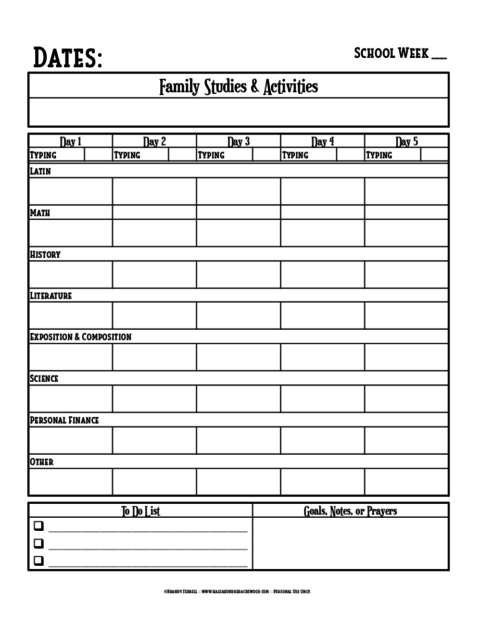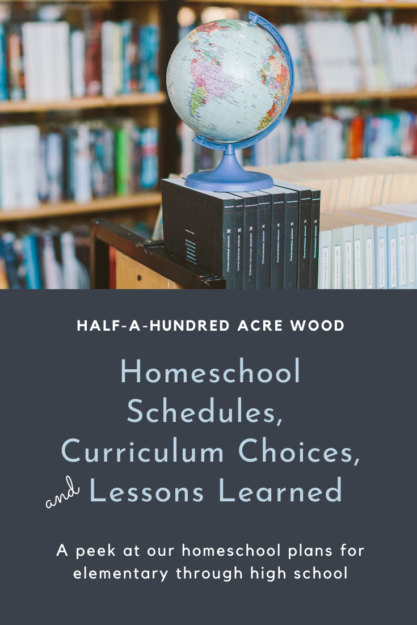
Any time we face a new thing, it can be too scary and overwhelming to even glimpse at the road that lies ahead. We listen to a thousand voices telling us the best way to do it, all the while making comparisons to others who seem to have it all together. The hardest voice for me is the one inside my own mind that tells me that I shouldn’t even try – that I should just give up and not do this thing that God has planted in my heart. Have you been there?
I remember several years ago… when we were just starting to consider homeschooling our children. Man, that was such a foreboding decision. I mean, if we homeschooled, I would no longer be able to blame someone else for my children’s educational or character pitfalls. My husband and I decided to follow this calling even though we didn’t really know how to do it. We stepped out of the boat into the unknown waters and just trusted that Jesus would be there to catch us.
When we’ve faced a new direction as a family, I’ve had to remind myself of something over and over again. When I take my eyes off of God and gaze upon my own abilities and limitations, I’ll only see all the ways I could fail (or succeed, but I usually just see the potential failures when I’m looking through the in-my-own-abilities lens). I’ll forget the clear calling that led me to this decision, I’ll forget that God is bigger than what I face, and I’ll forget that God can use anything, regardless of whether I fail or succeed.
Before I share more, I just want you to know… I am a real mom. Our family may run a curriculum business, but, first and foremost, we are a family who loves and serves God. I enjoy writing curriculum and sharing ideas (and my husband enjoys shipping, receiving, and customer service), but I am not that mom who has it all together. My ongoing prayer is that what we share here and what our business stands for continues to bless other families. My husband and I are grateful for the opportunity to homeschool our family alongside yours.
Before providing a sneak peek at our schedules and curriculum selections, I wanted to revisit my top lessons learned from our first 10+ years of homeschooling…
Lessons Learned from a Decade of Homeschooling
- Seek first the kingdom of God. Loving God and fellow man (including siblings) takes precedence over everything else.
- Relationship is far more important than curriculum and lesson plans. Get to know your children and their interests. Seek opportunities to encourage them in those interests, but also hold them accountable to do their best in whatever they do.
- Young children operate best with short 15-minute lessons and plenty of time to explore nature and use their hands. (Boys especially struggle with sitting at a desk for long periods of time. We’ve completed our book work on the playground, the trampoline, the patio, sitting upside down in a chair…)
- Reading together provides an opportunity to build your family’s relationships through shared stories and discussion. During family read aloud time, it’s okay if children are using their hands (playing with LEGOs, coloring, etc.). In fact, we’ve found that it’s necessary.
- Give yourself and your children the grace of tapering into the school year, taking breaks when needed, and doing whatever needs to be done in the midst of your real, everyday lives.
- Be prepared, but hold your plans and expectations loosely, for God may have a special unexpected purpose for your family to pursue.
- Focus on learning and character-building rather than grades and test scores (at least until middle or high school).
- Resist falling into the trap of comparison. Comparison is the death of contentment. Do what’s best for your family, regardless of what others say.
- Choose joy. Learning can be hard, but it’s also exciting and rewarding. If you’re filled with a sense of dread as you enter a new school year, it’s time to change what you’re doing.
- If you’re new to homeschooling, start simple. Reading, writing, and arithmetic. These are the foundational skills needed for learning anything. Add other things when you discover interests and giftings.
- Be confident but also recognize that plan doesn’t equal reality. As with starting anything new, it may be a rocky road at first. (Remember, mercy triumphs over judgment!) Pray for guidance, wisdom, and grace, and lay all your efforts at the feet of Jesus. It’s all for Him anyway!
Homeschool Schedules
Let me take you back to when we first started homeschooling. What follows is a bare bones schedule for learning the basics.
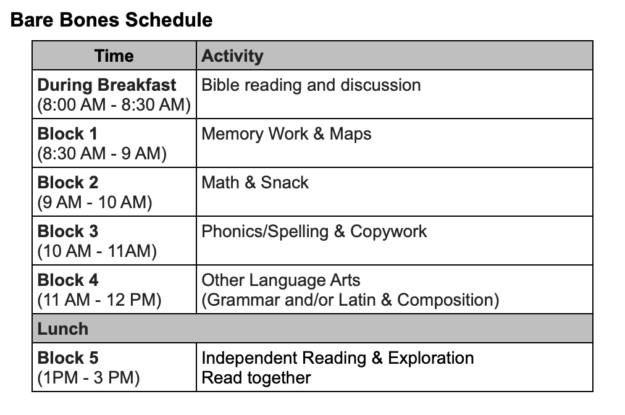
This was the schedule we followed until our thirst for more truth, goodness, and beauty prompted us to seek new learning adventures beyond the basics. Over time, our family started to long for the wonder and beauty of music, art, poetry, science, and literature. We discovered the passions of our children and pursued hands-on history studies with our oldest (who has always loved history). Then we felt a genuine desire to make the Great Commission the focus of our learning endeavors. And as our oldest boys became teenagers, we wanted to stay connected in our learning even though they were studying high-school level material. And so our reading plans, blog posts, and schedules have morphed over time to fit our family. Thus, our current schedule looks more like this:
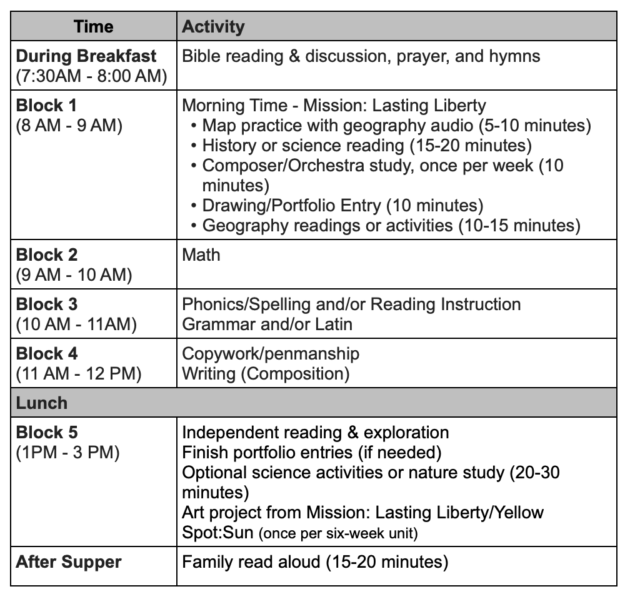
This schedule is not set in stone. Sometimes we’re not even all awake by 7:30! In reality, our homeschool is more of a juggling act. After our morning time (which consists of readings and/or activities we use to jumpstart our school day), our high schoolers follow an independent schedule, choosing the order in which they complete assignments, and they engage me in discussions or ask questions as needed. When I’m working with our youngest, his brothers are working on something they can do without my assistance so that they don’t interrupt.
Curriculum Choices
We have students at every level: elementary, middle, and high school. Before the school year starts, I take each of our children out individually for a “dessert date.” This is where we set goals and choose curriculum for the year. I love to set goals with my children, and I love learning with them. It’s one of the biggest reasons we homeschool. Another reason is learning together, which leads me to…
Family Morning Time
Our family starts together with a common morning time which usually takes about 1 hour, part of which is over breakfast. This is our most special time, and everyone (from our youngest though our teenagers) loves to be a part of it. After that, our older students are fairly independent in their individual work and just ask questions as they need my assistance. After morning time, most of my day is spent on teaching reading, writing, and basic math (first grade), formal writing (6th grader), and answering questions (the whole crew, as needed).
- Mission: Lasting Liberty. Plan includes Bible, U.S. history, hymns, art, music, poetry, geography, science, scripture memorization, and read-alouds. Memory work includes poetry & hymns, U.S. geography, and scripture.
Lower elementary (1st grade)
In the primary grades especially, we set aside time for discovery, exploration, and reading aloud. Until about 2nd or 3rd grade, the focus of our individual instruction is on reading, writing, and arithmetic.
- Reading/Phonics: Finish All About Reading Level 1 and start All About Spelling Level 1. Read more about the All About Reading program here.
- Writing: Script-n-Scribe Letter Connector. We start our boys with cursive. Read why here.
- Arithmetic:
Math Mammoth.Although I like Math Mammoth for upper elementary, I’m not fond of how Level 1 is laid out. So… we’re once again using Singapore Math Primary Mathematics. (Workbook | Textbook) - Social Studies, Science, and Fine Arts: Mission: Lasting Liberty during morning time. We also plan to use Trailblazing Transit for art project tutorials that correspond nicely with Mission: Lasting Liberty.
Middle school (6th grade)
Our middle schooler will follow the middle school options within Mission: Lasting Liberty for science, history, and civics.
- Mission: Lasting Liberty Subjects
- Scripture Memorization & Bible Study: Family Bible readings, hymns, and scripture memory from Mission: Lasting Liberty. Personal Bible study from The Ology.
- History & Constitution Study: Mission: Lasting Liberty. (Includes keeping a history portfolio.)
- Geography/Cartography: Mission: Lasting Liberty. (Includes making a homemade U.S. States Atlas and drawing the USA freehand.)
- Science: Mission: Lasting Liberty. (Includes keeping a science journal first semester and a lab journal second semester. Also includes memorizing/drawing body systems first semester.)
- Fine Arts: Orchestra/composer and art study from Mission: Lasting Liberty and Trailblazing Transit.
- Scripture Memorization & Bible Study: Family Bible readings, hymns, and scripture memory from Mission: Lasting Liberty. Personal Bible study from The Ology.
- Math: Math Mammoth
- Language arts:
- Spelling: All About Spelling (20 minutes). Read more about this program here.
- English Grammar: Fix-It Grammar – Level 3 (15 minutes) Teacher’s Manual comes with a downloadable student book. Read more about Fix-It Grammar here. Additional grammar instructions is through Latin.
- Composition: IEW U.S. History-Based Writing Lessons. Literature selections:
- Penmanship & Poetry Memorization: Script-n-Scribe Americana (5-10 minutes). During final 12 weeks, instead of memorizing new poetry, he wants to complete Grammar of Poetry. When he witnessed his older brother using Grammar of Poetry last year, he asked to add Grammar of Poetry to this year.
- Latin: The first 10 lessons of Visual Latin 1 (20 minutes). Try sample lessons. Update: Because our 6th grader will be using Visual Latin in 7th and 8th grade, he will be learning Greek and Latin word roots using Word Up Volumes 1, 2, and 3 from Compass Classroom. Try sample lessons.
Two weeks from our 6th grader’s schedule:
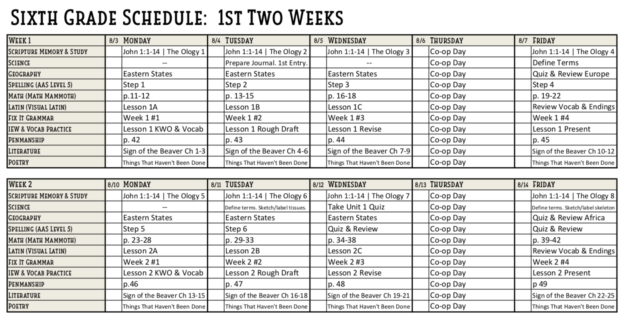
Click here to download a pdf of the first six weeks. Note: He’s picking up where he left off in his penmanship book.
Although this appears lengthy, several assignments take 5-15 minutes, and he is usually done with his school day by 2pm. As expected, the bulk of his time is spent on math, language arts, and independent reading. Scripture memorization and science follow the Mission: Lasting Liberty plan and will be reviewed during family morning time. Geography also follows the Mission: Lasting Liberty plan with a review of geography from Mission: World Wonders and Mission: Faith Forgers once per week. (Other subjects we cover during morning time are history, hymns, and fine arts.)
High School (9th grade)
Our 9th grader will be earning 7 high school credits this year: U.S. History (1 credit), English I (1 credit), Civics (1/2 credit), Keyboarding (1/2 credit), Health & P.E. (1 credit), Physical Science (1 credit), Math (1 credit), Foreign language (1 credit). We have considered waiting until his senior year for the civics credit, since he will be in 12th grade when we cycle back through U.S. History. (So, that may drop down to 6.5 credits.)
The following subjects overlap content from our Mission: Lasting Liberty program, providing a one-room schoolhouse atmosphere:
- History: Dave Raymond’s American History. (We love this history course! Read our review here. Download 2 free lessons: American History)
- Literature & Composition: IEW Advanced U.S. History Based Writing Lessons. American Literature selections include:
- The Scarlet Letter
- Last of the Mohicans
- Uncle Tom’s Cabin
- Adventures of Huckleberry Finn
- Up from Slavery
- To Kill a Mockingbird
- The Old Man and the Sea
- American Literature by Whit Jones. This worldview-driven anthology contains poetry, essays, and prose by famous authors from the Colonial Age to Modern Times. It qualifies as 2 English credits for literature and composition, but we are only using it for readings and to reference discussion questions. You can also grab the corresponding student notebook.
- Civics: ACE U.S. Civics Paces. This 6-booklet set not only covers the history and structure of the U.S. Government & Constitution, but it also highlights Greek, Roman, European, and church government, state and local government, politics, foreign policy, and the United Nations. The content itself is engaging, but we will use other forms of assessment rather than the fill-in-the-blank pages. If the format does not appeal to your family, you can check out Exploring Government from Notgrass which also includes many of the same topics. If you prefer a video-based course focusing primarily on the U.S. Constitution and supreme court cases, you can check out Constitutional Literacy (from HSLDA) or Constitution 101 (a free on-line course from Hillsdale College; there are several other Civics-related courses under the “Politics” heading). UPDATE: We decided to drop Civics until second semester or wait until his senior year to take this course.
- Health & Nutrition: Exploring Creation with Health & Nutrition. This course qualifies as a full credit.
- Science:
Exploring Creation with Physical Sciencewith Jay Wile’s corrections.This was a tough choice due to the errors in the new 3rd edition, but after reviewing alternate programs (Novare, BJU, ACE, and Abeka), we still prefer Exploring Creation with Physical Science. If you have a 2nd edition, we recommend it because the new edition includes several errors as pointed out in Jay Wile’s corrections. The overlap here is with chemistry, which is studied in second semester of Mission: Lasting Liberty. UPDATE: We ended up setting aside this curriculum due to how many errors there were – and the lack of adequate instruction. We recommend sticking with 2nd edition until errors are corrected within the 3rd edition. Instead of completing Physical Science this year, we’ve switched to biology, using Devotional Biology from Compass Classroom. You can download two free lessons here.
Other subjects:
- Personal Bible Study: New Testament Epistles.
- Math:
Jacob’s Algebra IFor a more traditional approach, we switched to Foerster Algebra 1. - Latin: Visual Latin 1 alongside Lingua Latina, a book written entirely in Latin. Download 2 free lessons here and read a detailed review of this program here. Also download this Free Visual Latin & Henle Teaching Guide if you’re using Henle First Year Latin. (As an alternate for those studying Henle, the Memoria Press First – Fourth Form Latin series is a four-year curriculum that completely replaces Henle First Year Latin. After finishing the form series, students are prepared to enter Henle Second Year Latin.)
- Spelling: Because our 9th grader struggles with spelling and needs to continue practicing, we aim to review Levels 5-7 of All About Spelling.
Two weeks from our 9th grader’s schedule:

Notes: For his official keyboarding credit, he will use how-to-type.com second semester.
High School (12th grade)
Our 12th grader only needs two credits to graduate: Advanced Math and English IV. He’s already earned 9 hours college credit due to his score on the ACT and a history CLEP test. This year, he aims to take additional CLEP tests in history and political science (and possibly math.) Currently, he’s looking at majoring in biology or biochemistry, but he is taking a course in Physics this year to see if he would rather pursue a degree in that field. What’s listed here is what he has chosen to study.
- Personal Bible Study: New Testament Epistles
- Science: Exploring Creation with Physics.
- Math: Math-U-See Pre-Calculus.
- Exposition & Composition: A combination of IEW Classical Rhetoric with Structure & Style and Fitting Words – Classical Rhetoric. His personal literature selections include:
- Speeches/oratory from ancient through modern times (from Fitting Words)
- Homer’s Odyssey. (He completed the Iliad over the summer.) When possible, we grab the Memoria Press literature guides to assist us in depth of learning.
- Virgil’s Aeneid.
- Augustine’s City of God. St. Augustine of Hippo was the greatest Christian philosopher of Antiquity, and City of God is considered his greatest work, as it influenced Western society and Christian thought more powerfully than perhaps any other book except the Bible. It has shaped some of the most important intellectual, theological, and political issues of the Western world. (Time permitting, he may also read The Confessions of Saint Augustine.)
- Dante Alighieri’s Divine Comedy. The union of the Christian and classical tradition, Divine Comedy is an epic allegorical poem about Dante’s spiritual journey of redemption.
- Shakespeare’s Henry V. A history.
- Shakespeare’s Hamlet. A tragedy. He may reference the first four lectures of Hillsdale’s free course on Shakespeare.
- Shakespeare’s Much Ado About Nothing. A comedy.
- *Other titles will be chosen from a list of world literature.
- Extras:
- History: This year, he would like to simply audit a Dave Raymond course because he enjoys these courses so much. While Antiquity fits with what he’s studying in literature, he’s most interested in taking Modernity. Download 2 free lessons: Antiquity (Ancient History) | Modernity (Modern World/American History) Each course is one credit of history for high school. (He had originally planned to take two of Dave Raymond’s history courses last year but ended up preparing for and taking a CLEP test in early U.S. history when he finished Dave Raymond’s American History. )
- Preparation for additional CLEP exams
Two weeks from our 12th grader’s schedule:
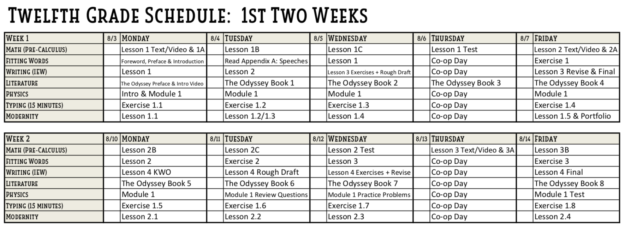
At the beginning of the semester, I usually hand a simple single-page syllabus to our high schoolers (the first two weeks are shown below)…

…and each week they plan out their week using a planner page:
Our oldest son likes to write as little information as possible, so he prefers a two-week-per-page planner:
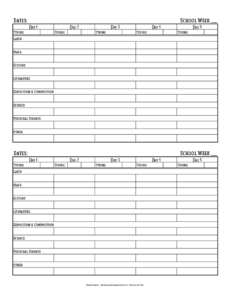 Download a blank pdf version of each of the above planner pages: Single-Week Page | Double-Week Page
Download a blank pdf version of each of the above planner pages: Single-Week Page | Double-Week Page
During middle school, we coach them on how to plan their school day so that by the time they enter high school, all they need is a single-page syllabus. It’s such a relief when they get to this point!
If you’d like to take a look at a scope and sequence for fulfilling history credits, visit this post.
Many of the resources above are part of the Compass Classroom Membership, a monthly subscription option allowing homeschool families access to over 30 courses. You can test drive all the courses for free for one week!
As I witness our oldest son learning alongside our youngest – with the joint history and science discussions, the heart talks about missions and martyrs, the joy of learning old hymns and new, the scriptures we’re memorizing together, the picture studies, poetry, and art projects, and the overall memory-making – homeschooling truly has been such a gift to me. I am grateful for this freedom we have and never want to take it for granted.
If you have any questions about this schedule, about any of our curriculum choices, or about planning in general, feel free to drop down the comments or send us an email! We’d love to hear from you!
[I am] confident of this very thing, that he which has begun a good work in you will perform it until the day of Jesus Christ: -Philippians 1:6

